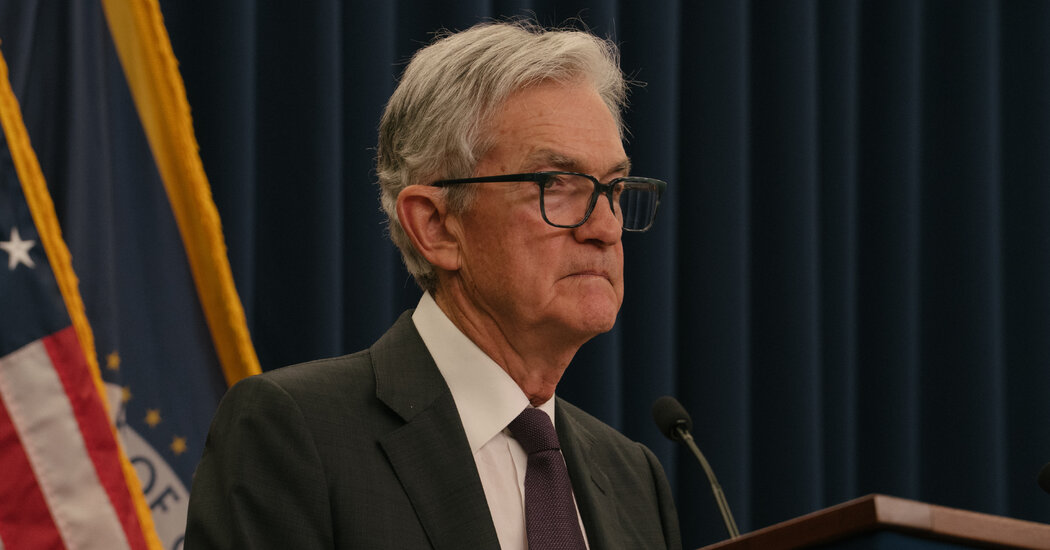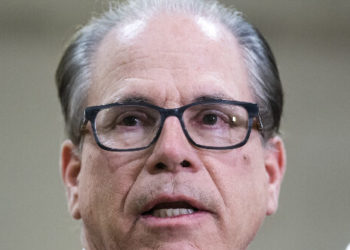For years, the Federal Reserve has patiently waited for any signs that it has shrunk its enormous balance sheet by too much. But with warnings flashing in financial markets, some analysts worry the central bank waited too long.
Officials at the Fed will assess the situation when they meet this week to set interest rates. A decision on the balance sheet could be imminent: Jerome H. Powell, the central bank’s chair, recently signaled that it would soon end the program reducing the holdings, also known as “quantitative tightening.”
The Fed has gradually reduced holdings of Treasuries and mortgage-backed securities it bought during previous periods of stress, when it aimed to tamp down interest rates and support financial markets and the economy.
Those purchases, a strategy known as quantitative easing, are designed to lower the yield on government bonds and increase the amount of cash available in the market. Bonds that would have been bought by an investor are now owned by the Fed, freeing up the investor’s cash. As the Fed has reduced its balance sheet, the amount of cash lubricating markets has fallen.
The dynamic is clearest in the short-term money markets where banks and hedge funds borrow cash overnight, for trading or to cover payments needed that day. These markets are often referred to as the plumbing of the financial system because they help funnel cash to where it is needed but can cause havoc when they get clogged.
This month, banks and other market players were looking for more cash than money markets had available to lend, pushing up overnight interest rates. The secured overnight financing rate, or SOFR, rose outside the Fed’s target range one week this month, a rare occurrence. Some banks borrowed billions from a backstop facility the Fed set up after it inadvertently shrank its balance sheet by too much in 2019, creating a cash crunch that sent short-term borrowing costs surging at the time.
Recent market moves have been more modest than that episode. But the volatility has refocused attention on the Fed’s balance sheet and raised the prospect that the central bank could stop shrinking it soon.
“Alerts are going off on a very regular basis right now,” said Lou Crandall, chief economist at Wrightson ICAP, a financial research firm. “Boy, are we getting some signs that we shouldn’t be complacent about understanding what is going on.”
The Fed started reducing its balance sheet more than three years ago as it unwound a pillar of its emergency response to the pandemic-induced financial panic. It had also bought securities during the 2019 episode as well as during the 2008 global financial crisis.
At its most recent peak in 2022, the Fed’s balance sheet swelled to nearly $9 trillion. Now it is around $6.6 trillion. At the same time, the reserves that banks hold at the Fed have fallen to just above $3 trillion, from over $4 trillion.
The Fed last adjusted its balance sheet policy in May 2024, when officials said they would slow reductions. They said they would stop shrinking it when the amount of money in the banking system was “somewhat above the level” that officials “judged to be consistent with ample reserves.”
“Ample” was not specifically defined, but many analysts and policymakers believe the Fed is approaching it. While Mr. Powell this month described the level of reserves in the financial system as “abundant,” he also cited signs that liquidity in the financial system was “gradually tightening.”
“It was meant to be a signal: The end of Q.T. is near,” said Gennadiy Goldberg, head of U.S. interest rate strategy at TD Securities, referring to Mr. Powell’s speech and quantitative tightening.
Mr. Powell’s recent comments on the balance sheet followed extensive debate among Fed policymakers about the right time to end quantitative tightening. At the Fed’s last meeting in September, Julie Remache, who helps manage the balance sheet at the Federal Reserve Bank of New York, said that if the current pace continued, reserves in the banking system would fall to around $2.8 trillion by the end of March.
Christopher J. Waller, a Fed governor, has estimated that the minimum amount of reserves needed to ward off funding problems is $2.7 trillion.
Mark Cabana, an interest rate strategist at Bank of America, said those estimates did not appreciate banks’ appetite for holding on to cash since the failure of Silicon Valley Bank in March 2023. He said the required level of reserves was closer to $3 trillion.
Regardless of the exact level, analysts said it would be in the Fed’s interest to stop soon to avoid the risk of a more severe market disruption. “It’s a long overdue reaction from the Fed,” Mr. Cabana said.
Some noted that next year, the Fed might need to start buying securities again, either to top up the level of reserves if they have indeed fallen too far or to simply keep the size of the balance sheet proportional with growth in the market and the economy to continue to ensure there is enough cash in the system.
“Why create the risk?” asked Priya Misra, a portfolio manager at JPMorgan Asset Management. “There is a huge gap between the haves and the have-nots,” she said of the amount of cash in the financial system. If the haves start to hoard reserves, then the market is not going to function.”
Joe Rennison writes about financial markets, a beat that ranges from chronicling the vagaries of the stock market to explaining the often-inscrutable trading decisions of Wall Street insiders.
Colby Smith covers the Federal Reserve and the U.S. economy for The Times.
The post Strains in Short-Term Markets Raise Urgency of Fed’s Balance Sheet Debate appeared first on New York Times.




